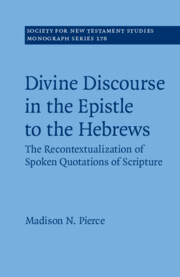 Divine Discourse in the Epistle to the Hebrews
Divine Discourse in the Epistle to the Hebrews The Son Responds to the Father
Published online by Cambridge University Press: 14 August 2020
This chapter examines passages in Hebrews where the Son is portrayed as the speaker of Scripture quotations (Heb 2:10–18; 10:1–10). In Hebrews 2, the Son, perhaps responding the Father in Hebrews 1, pledges to praise God among his human siblings. He likewise expresses his own faith in the Father. In Hebrews 10, the Son presents himself as a willing offering who has entered the world to do the Father’s will. In each case, Jesus speaks to the Father and demonstrates his status as an exemplary representative among humanity.
To save this book to your Kindle, first ensure no-reply@cambridge.org is added to your Approved Personal Document E-mail List under your Personal Document Settings on the Manage Your Content and Devices page of your Amazon account. Then enter the ‘name’ part of your Kindle email address below. Find out more about saving to your Kindle.
Note you can select to save to either the @free.kindle.com or @kindle.com variations. ‘@free.kindle.com’ emails are free but can only be saved to your device when it is connected to wi-fi. ‘@kindle.com’ emails can be delivered even when you are not connected to wi-fi, but note that service fees apply.
Find out more about the Kindle Personal Document Service.
To save content items to your account, please confirm that you agree to abide by our usage policies. If this is the first time you use this feature, you will be asked to authorise Cambridge Core to connect with your account. Find out more about saving content to Dropbox.
To save content items to your account, please confirm that you agree to abide by our usage policies. If this is the first time you use this feature, you will be asked to authorise Cambridge Core to connect with your account. Find out more about saving content to Google Drive.